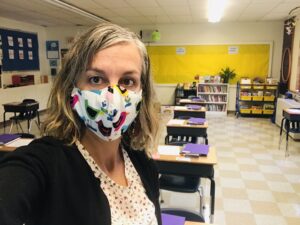
Every single teacher I know: family, friends, on social media, across Vermont education..they are exhausted. Like brand new teacher, working 24/7, going to bed at 8pm exhausted.
They are living day to day. Doing the next right thing. Over and over again. They are simultaneously trying to do right by their students and their families, and colleagues, then also trying to parent, check in on family and friends, make sure there are groceries, and driving to practices, appointments, etc.
This has always been true, but the current situation has magnified existing problems in the teaching profession, leaving many educators deeply bone tired and at risk for the health consequences of that.
I’ve written quite a bit about teacher sustainability and attrition (Why Great Teachers Quit, and more recently, for Edutopia) and how schools can focus on increasing teacher agency, humanity, and wellness. Recently, I wrote about three more concepts that are often hidden, barely expressed, but consume more of teachers’ lives than ever.
They are emotional labor. Decision fatigue. And daily uncertainty. These ideas were not talked about much before the pandemic, and now, I think they are the main reasons teachers find themselves, like I did, unable to hold conversations with my spouse about schedule coordination at 8:30 pm, unable to to read directions on a Get Out the Vote action I wanted to do, and unable to even watch a TV show on a school night this past week.
The emotional labor of teaching in a pandemic has increased exponentially. For those of us teaching in person (and virtually too, come to think of it), we are on heightened alert emotionally, looking out for students’ mental and physical health. With parents and caregivers under significant stress, students are feeling this and are carrying it with them. Teachers have the constant labor of working to keep kids safe at school, with very high stakes. This looks like mask reminders, bathroom monitoring, material/supply management, and careful learning activity planning to safely social distance, or long screening processes.
We hear the whisper.. “If you mess this up, your students and their families could get sick”.
This conflicts with how much I want to help students, as I bend over to say, yes, you can take a break, yes, it is okay to feel scared/nervous/anxious/worried. And then there is the labor of constantly evaluating situations.. is this activity okay? Is this too close? Do we wear masks outside for this game? This lesson? Do I pick up that pencil or book? Do we share books in the classroom library? And then of course, how am I keeping my own family safe spins in the background. Consider teachers who are pregnant, or families that are fighting other illnesses, or preexisting conditions.
All of this combines to create decision fatigue, because teachers were already making thousands of decisions a day — and now– thousands more, with much higher stakes.
It is no wonder that you stare at the salad dressings for 15 minutes, in your sweaty mask, unable to decide. Or can’t fathom deciding what to make for dinner. Our decision making skills have been all used up.
And then there is the creeping uncertainty that chases teachers around like a small, aggressive, barking dog. It is the bark of: be ready to go virtual at any minute. Do you have what you need? Do you have all the materials? Because this building might get shut down at any second. Or your situation might change at any minute. So, be ready. The ground you stand on is not solid. And standing there is exhausting. Behind that is all the news, the stories, of sick teachers, of Covid closing schools, of new cases, a constant bark that unsettles, takes away sleep, and sets you off balance.
So, in all this coverage of teaching in a pandemic, consider the heavy toll emotional labor, decision fatigue, and massive uncertainty is taking on your teachers. It is an often untold story.
If you are a school leader, consider, how can you streamline communications, support your teachers’ wellness, and simplify their lives right now? How can you also do that for yourself?
Because it is only September. And we have only just begun.
